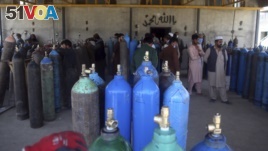06 July 2020
An Afghan man has reopened a long-shut oxygen factory to provide free service to patients suffering from COVID-19.
Najibullah Seddiqi says he closed his factory in 2013 because he had difficulty signing deals with hospitals to supply oxygen.
But as the coronavirus continued to spread in Afghanistan, he saw a big need for oxygen that his old factory could help fill.
"I saw a man crying for his wife who died from coronavirus due to lack of oxygen," Seddiqi told The Associated Press. "That moment I made the decision to reopen my factory."
Now, family members of Afghans suffering with COVID-19 line up at his factory in Kabul to receive free oxygen refills that can keep their loved ones alive.

People line up for free oxygen at a privately owned oxygen factory, in Kabul, Afghanistan, Thursday June 18, 2020. For seven years, Najibullah Seddiqi's oxygen factory sat idle in the Afghan capital Kabul.
Afghanistan has struggled with shortages of medical oxygen during the coronavirus crisis. It gets its oxygen cylinders from outside the country. Until recently, imports were halted because of border controls.
Shortages have caused the price of new oxygen containers to rise sharply to about $250. The price to refill the containers is now $25, five times what it once was. Many people blame the increases on overcharging by retail sellers and government failures to guarantee a supply.
Seddiqi's free service is a popular solution for many poor people hit by the virus. As word of the free service spreads on social media, vehicles line up with people seeking to refill cylinders.
"This factory is doing great work offering it for free," Bilal Hamidi told the AP. He said he fills three small cylinders a day for his brother, who was infected with the virus while caring for their mother. Their mother died of COVID-19 in early June.
The factory was dusty and the equipment run-down when Seddiqi decided to restart production. But everything still worked. "I'm happy I didn't sell these machines," Seddiqi said.
He hired 12 men to help. He even moved into the factory temporarily so he can react to situations quickly. "I'm worried that I go home and someone in intense need comes late at night and doesn't find anyone to help them."
His factory refills about 200 to 300 small cylinders a day for COVID-19 patients – for free. For hospitals and retail sellers, he fills nearly 700 large cylinders a day for about $3.80. He said that is far below the usual rate, but still enough to cover his costs.
Retailer sellers deny that they have been overcharging for oxygen. Imports of cylinders from the United Arab Emirates and China stopped for months because of restrictions related to the virus. They recently started again. However, "unbalanced supply and demand has caused prices to rise," Khanjan Alkozai told the AP. He is a board member at the country's Chamber of Commerce and Industry.
Afghan media reported last week that several COVID-19 patients died in government hospitals because of a lack of oxygen. The government denied the reports.
Lawmaker Fatima Aziz, who was infected with the coronavirus, spoke about the issue in a video from her hospital bed. She was shown receiving oxygen through her nose. In the video, she blamed corruption and government failures for the shortages.
"People lose their life for two drops of oxygen," she said. The lawmaker denounced "mafia" groups that she accused of taking over the medical oxygen business.
A health ministry spokeswoman told the AP that hospitals were working to reduce oxygen shortages.
Seddiqi's factory is one of six in Kabul that produce oxygen. But his is the only one giving free refills. "My only aim is to save as many lives as I can," he said. "When the virus spread ends, then I'll go home."
I'm Bryan Lynn.
The Associated Press reported on this story. Bryan Lynn adapted the report for VOA Learning English. Ashley Thompson was the editor.
We want to hear from you. Write to us in the Comments section, and visit 51VOA.COM.
________________________________________________________________
Words in This Story
cylinder – n. a container with circular ends
retail – v. the activity of selling products to the public in shops and on the internet
run something down – phr verb. to be reduced in quality or condition over time
mafia – n. a group of people who are involved in similar activities and help and protect each other, sometimes to the disadvantage of others